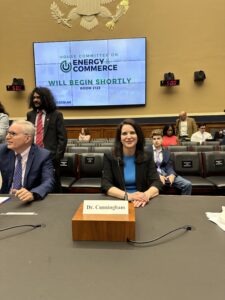A Mid-Year Update from Dr. Arpan Waghray, CEO, Providence’s Well Being Trust
In the words of Dr. Barbara Fredrickson, “The negative screams at you, but the positive only whispers.” This powerful statement resonates deeply with the challenges and triumphs we encounter in the mental health field.
Often when we hear about mental and behavioral health in the news or in our professional circles, what we hear is dire – we are in the midst of a mental health crisis. However, while we recognize this reality, it’s also essential to acknowledge the positive strides being made that are gradually taking effect.

- Two years after the launch of the 988 Suicide & Crisis Lifeline, more than 10 million people are using this resource to get help when they need it most.
- The recent addition of 10 states to CCBHC Medicaid Demonstration Program is providing states with sustainable funding to help them expand access to mental health and substance use services.
- Surgeon General Dr. Vivek Murthy recently calling on Congress to require a tobacco-style warning on social media platforms, is an investment that would especially help protect teen mental health.
- The Substance Abuse and Mental Health Services Administration’s historic investment of $46.8 million in funding opportunities to promote youth mental health, grow the behavioral health workforce, and improve access to culturally competent behavioral care across the country.
- AmeriCorps announcing the launch of the nation’s first Youth Mental Health Corps to help teenagers access critical mental health resources – while also creating training and career pathways for young people.
Indeed, significant strides are being made in strengthening our national mental health infrastructure, and I am enthusiastic about the continued progress.
Below is a summary and examples of the work we are doing throughout Providence’s Well Being Trust to advance mental health and well-being.
Our commitment to increasing access to mental health care
Providence’s Well Being Trust has committed to increasing access to mental health care to 1 million people in the Western United States by 2026. In the past 18 months, we have invested more than $10 million in our communities. We’re already seeing the impact, with 600,000 projected lives impacted; 40 community partnerships; and 13,300 patients potentially receiving life-saving care for opioid use disorders, suicidality and depression.
We are committed to achieving measurable improvements in access to whole-person, compassionate mental health support and care for our patients, caregivers, and members of our community.
And we aim to achieve three bold goals through this long-term commitment:
- Increase the rate of Providence patients who are seen for a mental or behavioral health condition, to close the gap between those who need care and those who get it.
- Increase proactive mental health education and outreach to Providence’s caregivers, and ensure caregivers can get timely behavioral health care.
- Increase the number of individuals supported with mental health and/or substance use services or resources in our communities.

We’re committed for the long-haul – not just for the current quarter or fiscal year.
That’s why we’re planting the seeds now for long-term change. And if we want to see change over the course of the next generation, we have to invest in how we deliver care; in our communities; in our young people, and in policies that will shape access to mental health care.
Driving behavioral health innovation; deepening collaboration with community partners

The grants support initiatives aimed at increasing sustainable access to quality mental health care and resources throughout the Providence seven-state footprint, as well as advancing mental health and well-being nationwide.
This year’s grants include internal initiatives throughout Providence, community-based external initiatives alongside our community partners, efforts supporting youth and teen mental health, and efforts to transform the United States’ mental health and addiction systems.
We will continue to share outcomes from these initiatives and provide updates about the work that we’re doing to foster long-term sustainability of these projects.
Supporting youth mental health
Through the Providence and Seattle Sounders FC partnership, we’re addressing youth mental health, and using our platforms to improve mental health resources for youth to normalize the conversation and to destigmatize mental illness.
We’re also bringing access to mental health support at no cost to 15,000 children in the Renton School District. Funded by Providence’s Well Being Trust, virtual therapy services were launched throughout the Renton School District in August 2023 and provide access to students in the district at no cost. Since the launch of this service, more than 1,200 virtual therapy sessions have been provided to those most in need. Work2BeWell, has also led efforts to democratized knowledge by empowering teachers and students with tools and resources from various school-based mental health curriculums.
This is what is possible when we all come together.
Caring for our caregivers
Caring for our caregivers’ mental health is not a nice-to-have – it’s a prerequisite for delivering excellent care to our patients, as well as a moral imperative. Our caregivers give their time, expertise and deep caring to our patients and their jobs – so much so that they often ignore their own needs. That’s why it’s imperative that we support them and actively help cultivate their mental well-being.
That’s why Providence is proud to announce this year that we were awarded a 2024 Platinum Bell Seal for Workplace Mental Health by Mental Health America. The Bell Seal is a first-of-its-kind workplace mental health certification recognizing employers striving to create mentally healthy workplaces for their employees.
This is the kind of excellence we seek in our efforts to ensure every employee proactively receives guidance and resources to support their ongoing mental health and well-being, and ensuring that those who are struggling can get timely behavioral health care when they need it.
TelePsyhchiatry: Virtual care for patients in rural and underserved communities
Providence’s TelePsychiatry service is bridging a critical gap in access to mental health care by providing services to patients in rural and underserved communities.
The program provides on-call, virtual bedside access to board-certified psychiatrists and licensed clinical social workers to diagnose and start patients on the path to treatment. In 2023, the program achieved a 10-minute response time for 9,800 consultations.
This timely access to mental health care not only ensures that patients receive the support they need promptly but also results in improved patient satisfaction.
Mental health-supportive policies
“We stand at the precipice of what may be the most consequential year for telehealth policy to date, the urgency for Congress to act on Medicare telehealth flexibilities cannot be overstated.”
Dr. Eve Cunningham, Chief of Virtual Care and Digital Health, Providence

My colleague Dr. Eve Cunningham, chief of virtual care and digital health at Providence, recently testified to the U.S. House of Representatives to advocate for legislation to support telehealth as a continued benefit for Medicare beneficiaries.
She shared in her testimony to the U.S. House of Representatives, “we stand at the precipice of what may be the most consequential year for telehealth policy to date, the urgency for Congress to act on Medicare telehealth flexibilities cannot be overstated.”
Other pending legislation could help improve timely access to behavioral health care, strengthen parity requirements, and significantly increase the behavioral health workforce pipeline.

I had the privilege of engaging with stakeholders from a variety of industries and backgrounds and we collectively explored innovative ways to collaborate and synchronize our efforts across different sectors to transform mental health care.
Looking Ahead
These signs of progress give me great confidence that with a long-term commitment from Providence and from leaders and partners across sectors and with dedicated resources and metrics to track improvement along the way, we will turn the tide on the mental health crisis in our country. And that’s the kind of news I am looking forward to hearing more of as we turn the corner to the second half of the year.
We invite you to follow us on LinkedIn at @WellBeingTrust, for additional updates about our efforts to increase mental health access, improve quality care, and advance our work nationally with like-minded partners.







